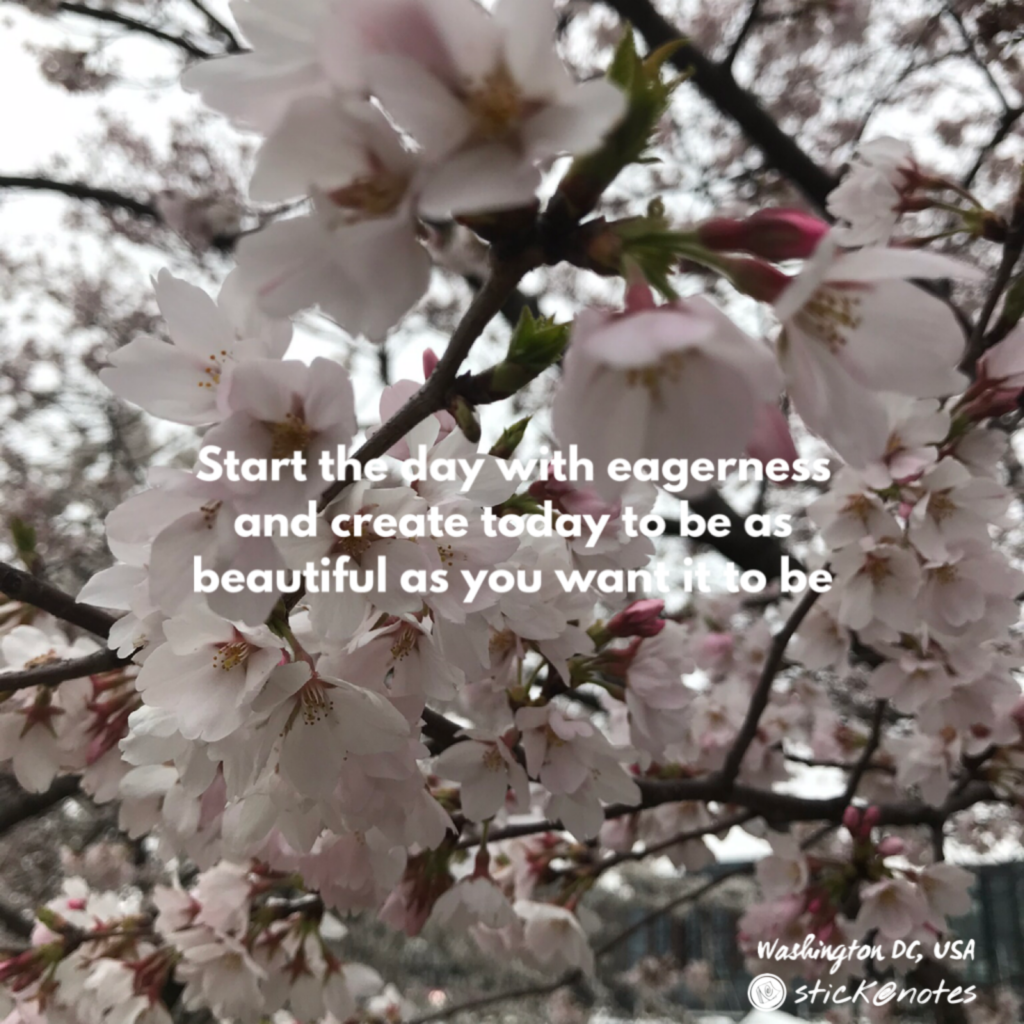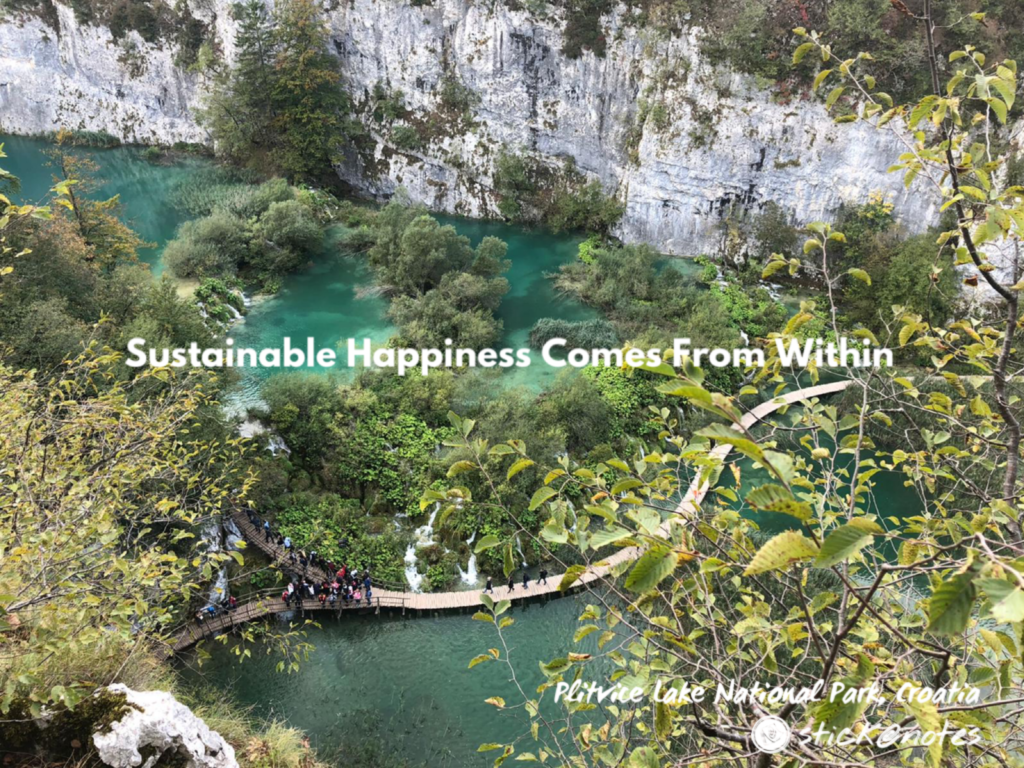-
Four Things To Start Each Day With Eagerness
Sometimes it is hard to wake up in the morning with great enthusiasm when we are down, especially during difficult time like the current pandemic, where one negative news after the other keep coming through our smart-phone feed and social media.
The pandemic has caused so much change and hardship to many people and businesses. For many, stay-at-home order without any jobs can be overwhelmingly stressful and depressing. The financial hardship that comes along with losing a job can affect overall physical and emotional health.
While certain challenges can pull us down, there are four things we can do to start each day with some kind of eagerness, maintain our spirits, and end the day feeling good about what we have accomplished.
1. Put something you love and are most excited about first thing in the morning
Think about something you love to do and most excited about, and put that activity first thing in the morning. Setting the most enjoyable routine in the morning would give you the excitement to get out of bed and start the day right.
2. Be thankful
Think or list at least four things to be thankful about every morning. When your brain is busy being thankful, it is hard to think about something negative. Being thankful gives out the most powerful energy to switch your emotions from feeling down to feeling blessed. Being thankful gets rid of all kind of negative emotions like annoyance, sadness, fear, or unfairness. It gives you both enjoyment of the present moment and positive energy to move forward.
3. Use and share your gifts and talents
Think about one or two things you are really good at and enjoy, do something about it during the day and share your gifts with your colleagues, friends or family. Let’s say you are good at computer/database system at work where most employees are not computer savvy, share your knowledge with your co-workers and help them when they are having a hard time with it. If you are good at cooking, prepare a meal that can be enjoyed together with your family. If you are talented at organizing, plan to organize one small area in the house or at work each day. Basically, use your gifts and what you enjoy most as daily routine. You would have the excitement to do what you love, and in the same time share the results with others. Imagine the smiles you can generate for yourself and people around you!
4. Make each day as learning opportunity
Be ready and excited to learn something new each day. When we are open to learn continuously, we will look at everything in life entirely from a different angle. We wouldn’t be worry so much what challenges we face ahead. We are set to learn and grow from them, grow to be a stronger, wiser, and better version of ourselves!
So yes you can do it. Stop dragging yourself out of bed. Start the day with eagerness and create today to be as beautiful as you want it to be!

-
Doing The Right Thing
Have you ever worked so hard to impress your boss, only to find that he/she dismissed what you did. And even criticized you for spending too much time on low priority job?
It certainly is upsetting when we choose to work hard to make ourselves look good, and not getting the responses we expect. Likewise, it is difficult to make choices when we are presented with two opposite forces.
There is nothing wrong when we occasionally expect acknowledgment or appreciation as an incentive to do better. Making choices due to fear of missing out (FOMO) or to gain others’ approval, however, often lead to stress and disappointment.
Everything we do in life is a choice. Those choices determine the kind of life that we are going to live. As a result, it is important to make good choices that are aligned with our values and life purpose. In other words, instead of doing something to follow the crowd, we should make choices that feel good, and feel right.
How do we know if we do the right thing?
Our conscience often guides us to know the difference between right and wrong. Doing the right thing also goes hand in hand with being true to our ethical values and principles.
To illustrate this, let’s look at a couple of examples. Let’s say your highest value is spending time with your family. Your boss offer you a promotion with good money but you have to be away from your family for extended period of time. You may crave for a better pay but you know that the money at this point is not worth going against your value, and doing the right thing is to say no to that offer.
Likewise, when you put transparency as one of your principles, you may find it stressful working for a company that has a culture of keeping employees in the dark. You can do the right thing proposing and strategizing more transparent communications, or move to another company that shares similar values.
Life is about making choices. Use your gifts, do your part, do the right thing, and don’t worry what everyone else is doing. And you will uncover the ability to make good choices in all aspects of life.

-
The Secret of Balance
We often hear that nothing is perfect; and it is not possible for a person to have it all. Bob is so successful in his career but his family is a mess. Katie is very smart and full of energy. She works more than 60 hours a week but her mental and physical health start to go downhill when she is in the late forties. We start to think that it is normal to be that way: we can’t have it all.
If we look into the above scenarios more carefully, the common denominator for Bob and Katie is that they spend too much focus in one aspect of life. And eventually, they experience negative consequences in the other areas of their life.
To illustrate the negative consequences of the extremes we need to look into all aspects of our life more carefully.
The Four Aspects of Life
There are four most important aspects of life where each one of them is tightly interconnected with the others: Self and spiritual, health (mind and body), family and friends, work and finance. Putting too much time and focus in one area is a surefire way to create problems in the other three. When we have all four aspects of life at a balanced state, we have reached a state where we have it all because our life is in harmony.
Self And Spiritual – The Foundation
In the midst of our busy life, we tend to put our “self and spiritual” wellbeing at a lower priority level. In reality, this aspect of life is the most important foundation to build a balance life. The way we understand and see our “self” determines how we approach the other aspects of life. Contented self is mindful, aware of feelings and thoughts that lead to happiness; and those that need changing within, and not without.
Giving time to self is essential for physical, emotional and mental health. It reduces stress, provides more positive energy and eagerness to work on the next tasks in front of you.
Setting aside “me” time each day can range from doing activities that you enjoy, such as praying, reading, listening to music, walking, to practicing mindfulness or meditating.
Practicing mindfulness, or self awareness, actually should be the priority of “me” time. It gives us the opportunity to build relationship with our inner self, and brings us to spiritual wellness.
The path to spiritual wellness allows us to connect the dots between experience, challenge, and life purpose; and helps us find deeper meaning of events in life. It also allows us to feel more connected to a higher power and other creations around us. We have more clarity when it comes to making everyday choices, and our actions are more aligned to our ethical values and principles.
The more we become aware of our inner self, the clearer to see what needs changing and improvement within. As a result, practicing self awareness helps us reaching and maintaining balance in all aspects of life.
The Interconnections
The interconnections among the four aspects of life is so tight that when we practice self awareness, we can identify any imbalances before it goes too far. Below are a couple of examples illustrating the consequences of imbalances touching the four aspects of life.
When we put too much focus on work and money, we become too exhausted to spend time with family and friends, not to mention the negative effects on our physical and emotional health due to stress, lack of sleep or exercise. On the other hand, lack of focus on career development prevents us from cultivating successful career, which may impact financial stability and self confidence.
Spending too much time caring for others but not enough “me” time can lead to mental and physical exhaustion. Likewise, having too much “me” time without doing something productive and purposeful tend to make us feel empty and unfulfilled.
Life is a journey to grow and be a better version of ourselves. Learning to attain balance is a part of this growth. Keeping all aspects of life in balance is the key to live this life to the fullest. It is the key to having it all. Strive to find a balance and we will live in harmony.

-
Our Feeling Is A Sensor
We are created so flawlessly with this tool called “feeling” to evaluate our daily encounters and circumstances. Without feeling, we might as well be robots, and life would be meaningless. We would be walking around without emotions. There would be no fun, no challenge, and no growth. Everything would be just….tasteless.
Feelings and Mind & Body
We react to situations which create positive feelings such as love, joy and excitement; as well as negative feelings such as anger, jealousy, disappointment, guilt, fear, or worry. The thoughts created by one or combinations of feelings, and vice versa, generate the most complex algorithm in our brain that even the most sophisticated computer apps is not able to imitate. There are too many variables going on in our mind that produce different results for each one of us.
Most of us have heard that healthy and happy mind create healthy body, while chronic stress puts our health at risk. No wonder why two people taking the same foods, drinks, or vitamins unlikely obtain the same results. Not only what we eat and drink, and how we exercise, but our cycle of feelings and thoughts are by far one of the most influencing factors to our health.
Feelings as a Sensor or Cues
How do we create healthy and happy mind? The mind that heals and keeps our immune system strong? What about using feeling as our sensor or cues, and “happiness” as the set point?
To do this, first we need to practice awareness – how we feel during our daily encounters. This means when we feel upset or sad, we shouldn’t run away from the problem by burying ourselves in our work, blame it on the past, or self-medicate with alcohol or drugs. Instead, use our feeling as a sensor or cues what attitude adjustment is needed for us to get back to feeling happy. We may have to learn to let go or forgive, accept the unchangeable, practice patience and humility, learn to give respect, or other virtues. Each time we are able to let go and/or adjust our attitude, we are one step away closer to the set point of “happiness”.
Practice Makes Perfect
This process is not an easy task at first. We have to be willing to adjust our perspective and mindset; and stop blaming others, the past, or situations for any negative feelings. While the adjustment process can be difficult and lengthy initially, it becomes our second nature eventually.
Soon enough we find previously annoying people or circumstances become less so, and negativity or judgement disappears. We find that we become calmer. Nothing really bothers us for more than a minute, because our control system (brain and awareness) is trained skillfully to adjust our attitude as our sensor (feeling) is a little off from the set point (happiness). At that point, we have achieved sustainable happiness. The type of happiness that comes from within.

